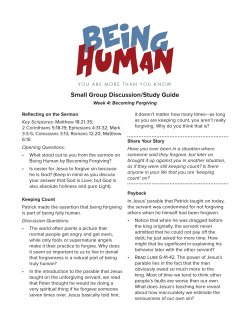
Yes - Crookston Baptist Church
Matthew 18:21-35 Redefining Forgiveness Sunday, June 7, 2015 Introduction: Last Tuesday we began our series on the Purpose and Vision of the Church. The first week of the series focused on being an authentic community. We discovered that our purpose begins with us fulfilling our mission to be a transformed Christ-like group of believers who live in community the way God intended for us to. Ephesians 4:1, says “that we are to do everything we can to keep the unity of the Spirit in the bonds of peace.” However, there will always be challenges to fulfilling our mission. It’s not always easy to live in community the way God wants us to. One of the biggest hindrances is unforgivenness. We all know we should forgive and we probably all think we know what it means to forgive someone; but do we really? Jesus’ disciples thought they did and they were wrong. In the text we’re considering today, Jesus redefined what it means to forgive. Interpretation: In Luke’s gospel (Luke 17:4) he records a conversation Jesus had with his disciples in Capernaum on his way to Jerusalem. In Luke's account, Jesus while trying to impress upon his disciples the importance of forgiveness, tells them that even if someone 20150607_Starks - P 1 sinned against them seven times in one day and each time repented and asked for forgiveness, then they were to forgive them seven times. Our text this morning is an account of that same journey from Capernaum to Jerusalem, and Peter’s question in Matthew 18:21 was probably precipitated by what Jesus said in Luke 17:4. The Jewish custom at that time was that a person was required to forgive someone only three times and yet Jesus had said to forgive seven times. Perhaps Peter wondered if Jesus was changing the forgiveness limit from the traditional 3 times to 7 times. However, this was not what Jesus meant when he said that they should forgive someone 7 times, which is why he responded to Peter by saying, “Not seven times, but seventy-seven times.” Jesus was redefining what it meant to forgive the same way he would later redefine what it meant to love. In John 13:34, Jesus said to his disciples, “A new command I give you: Love one another.” The command to love one another wasn’t new – Jesus’ definition of how they were to love was new. “As I have loved you, so you must love one another.” We’re supposed to love one another, right? Are you doing that? Well, based on Jesus’ new definition of love, it’s not love until you love like Jesus loves. 20150607_Starks - P 2 Just as he redefined what it means to love one another, Jesus redefined what it means to forgive. Just as we are to love others like God (as expressed in the life of Jesus) has loved us, so we are to forgive others like God has forgiven us. That’s the point Jesus was making when he said, “Not seven times but seventy-seven times.” Jesus then decided to use a parable to better illustrate this truth. This parable is divided into three separate scenes, each of which teaches an important truth about forgiveness. Application: The first scene (v.23-27) illustrates the boundless grace and mercy of God in forgiving our sins. The king forgiving his servant a debt he couldn't repay (about 1 million pounds in today’s money), is an illustration of God's forgiveness. One of the wonderful things we learn from scripture is that God is a forgiving God. The gospel is a message of forgiveness. The good news that in Jesus Christ our sins can be forgiven, our relationship with God restored, and our eternal destiny secured. That is what the king did for his servant who owed him a debt he couldn't repay. No matter what you've done or how many times you've sinned, God will forgive you if you confess your sins, repent and ask his forgiveness. 20150607_Starks - P 3 The debt of sin that we owed was not simply canceled, but was paid with the precious blood of Jesus Christ. God is not only a God of love; he is a God of justice. Our sins required a payment none of us could pay. The debt was so great that only God could pay it. Our forgiveness was free, but it wasn’t cheap. God became flesh and dwelt among us, and died on the cross in our place. Like the king in the parable, God has forgiven our enormous debt. The second scene (v.28-31) teaches us the absurdity of taking God's forgiveness for granted. When we hear of a story like this, no doubt we feel that the man got what he deserved. I mean, how could anyone who had just had a million pound debt forgiven, act the way this man did over a £10.00 debt. But you know what? Many of us have behaved the same way as that ungrateful servant! When we don't forgive someone who has wronged us we are taking God’s forgiveness for granted. Have we forgotten what God has done for us? Have we been saved so long that we can't remember all the dirty, rotten things we'd done in our life? Things for which we begged God to forgive us? God's grace is a model for forgiveness. God loves us to teach us how to love. God forgives us to teach us how to forgive. 20150607_Starks - P 4 Refusing to forgive someone who has hurt us, after all that God has forgiven us for is not only immoral, but illogical. We see the absurdity in that in the actions of the ungrateful servant. Forgiveness is first and foremost an obligation we owe to God. The third scene (v.32-35) teaches there are consequences when we don’t forgive. There is some debate about whether the apparent retraction of forgiveness for the first servant has a spiritual comparison. Does this teach that if we don't forgive God will take back his forgiveness to us? No, the lesson here is that God's forgiveness is open to all but at a condition and only those who forgive others demonstrate that they truly understand the nature of God's forgiveness. The nature of God's forgiveness is reciprocal. God forgives us only as we forgive others. Not that he takes back his forgiveness but we suspend God's forgiveness to us when we don't forgive others. You may be wondering, "Is there any time when I would be justified for not forgiving? Surely, there is some sort of limit or some circumstance when it would be O.K. not to forgive?" The short answer is no, but there are three exceptional circumstances that bear mentioning. o If a person is unrepentant. Forgiveness involves two things - the releasing of a debt or to pardon, and the 20150607_Starks - P 5 restoration of the relationship. You must let go of any anger or resentment, but without repentance the relationship can’t be fully restored. o If they are a continued threat to you or someone else. Again you must not hold any grudge, hatred or resentment but you do not have to put yourself in a position where they can continue to hurt you. o If they have committed a serious crime or offence. Christian forgiveness does not mean people should get away with their crimes. A truly repentant person will understand that although they desperately want to avoid prison, they have no right to expect, much less demand, exoneration. Conclusion: Just as we are to love others like God (as expressed in the life of Jesus) has loved us, so we are to forgive others like God has forgiven us. If we’re going to be an authentic Christian community, and protect the unity of the church, we must forgive as God in Christ has forgiven us. 20150607_Starks - P 6
© Copyright 2025













